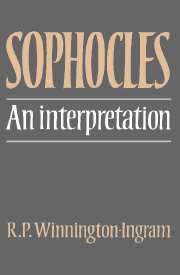Book contents
- Frontmatter
- Contents
- Preface
- Bibliography of short titles
- 1 Introductory
- 2 The mind of Ajax
- 3 The burial of Ajax
- 4 Trachiniae
- 5 Sophocles and the irrational: three odes in Antigone
- 6 Creon and Antigone
- 7 Fate in Sophocles
- 8 The fall of Oedipus
- 9 Furies in Sophocles
- 10 Electra
- 11 Oedipus at Colonus
- 12 Philoctetes
- 13 Heroes and gods
- Appendices
- Select index
Preface
Published online by Cambridge University Press: 07 December 2009
- Frontmatter
- Contents
- Preface
- Bibliography of short titles
- 1 Introductory
- 2 The mind of Ajax
- 3 The burial of Ajax
- 4 Trachiniae
- 5 Sophocles and the irrational: three odes in Antigone
- 6 Creon and Antigone
- 7 Fate in Sophocles
- 8 The fall of Oedipus
- 9 Furies in Sophocles
- 10 Electra
- 11 Oedipus at Colonus
- 12 Philoctetes
- 13 Heroes and gods
- Appendices
- Select index
Summary
The main function of criticism is the interpretation of individual works of art; and it is a primary concern of this book, by detailed study, to interpret the seven extant tragedies of Sophocles, each in its own unique form, quality and theme. Amid their variety, however, resides an elusive unity. Sophocles being a dramatist whose mind and vision are characteristic and, throughout a long career, remarkably consistent. ‘Sophoclean’ is not an empty term, hard as it may be to define, controversial as the tragic vision of this tragedian may be. It is, therefore, my further aim to inject some (more or less) new ideas or emphases into the general criticism of the author. This double aim has determined the form, in some ways unusual, of the book.
It is addressed, primarily, to those who are already familiar with the plays, but this does not mean classical scholars only. Except for footnotes, virtually all Greek is translated or paraphrased or, in the case of some words having thematic importance, transliterated. The classical scholar will demand, rightly, that the problems of a difficult text be faced: they are generally discussed in the footnotes which proliferate, and which the non-specialist will, rightly, disregard. The detailed arguments in the main body of the work will need no apology for those who agree that interpretation must be closely based upon the actual words of the poet.
I have read fairly widely in the modern critical literature of this author, but cannot claim to have covered its vast range. I cite liberally in footnotes works where some point of view receives cogent expression, but there may be many unacknowledged debts.
- Type
- Chapter
- Information
- Sophocles: An Interpretation , pp. vii - viiiPublisher: Cambridge University PressPrint publication year: 1980

